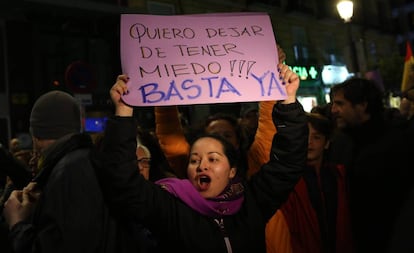A movement that’s being driven by young women
Spain is currently going through a generational change among feminist movements, one that has been key to organizing the March 8 actions

“You have to come to my school and convince the machos.“ That’s how many girls aged between 12 and 18 ask Pamela Palenciano to come to their place of learning and perform her monologue. For 11 years, Palenciano, a 35-year-old activist and artist, has been performing the piece No solo duelen los golpes (It’s not just the blows that hurt). In the monologue, she recounts how her boyfriend abused her when she was a teenager, playing all the roles herself – even that of the macho. “I have seen an enormous evolution. I have been amazed these last two years. And in everything that is happening, the most important thing is the power of young people.”
In the demonstration in 2017, which was the inspiration for the March 8 feminist strike, there was an overwhelming number of women under 30. They appeared again in mass numbers during the spontaneous street protests in solidarity with the 18-year-old who was allegedly gang raped by a group of men, known by their WhatsApp chat group name La Manada or “The Pack.” “No means no. The alternative is rape,” women such as Sara Nalia chanted in Madrid.
They are the result of mothers and grandmothers who have broken with social convention Former Equality Minister Soledad Murillo
Nalia has thrown herself head-first into organizing the strike. She is studying a double degree in Law and Philosophy and is a member of the 8M Commission, which brings together feminist collectives from across Spain. She is 20 years old and her interest in feminism began when she was only 14. “It started because of soccer,” she explains. “I play and I thought, ‘Why do they have to call me a tomboy?’”
Last night, she stayed over with other female colleagues from the Mathematics Department at the Complutense University of Madrid. These women have organized a protest and told their male classmates they can miss class and make them breakfast and lunch in support of the feminist strike. But Nalia insists they shouldn’t be the ones to tell them what to do: “When they ask, we say, ‘Organize yourselves, we are not going to be your mother in this process’.”
Role models
Nalia and Paula Laborda, who is also 20 years old, look up to the women who began the feminist struggle when Spain was under the dictatorship of Francisco Franco. “They are our role model of how we young women want to be,” says Laborda. Women such as Justa Montero, who is also on the 8M Commission and has been a feminist activist for many years. “It’s not that their participation is very important, it’s that the women between 16 and 30 are leading the process,” says Montero, who says the 2014 protest against changes to the abortion law kicked off the involvement of young women in the call. She says there has been a “wake up call,” something that other women interviewed for this article agreed with. “They have been educated in a society which in the beginning is governed by the principles of equality and suddenly they discover it’s not like this,” she explains.
Young women are looking up to those who began the feminist struggle during the Franco dictatorship
“They are the result of mothers and grandmothers who have broken with social convention,” says Soledad Murillo, equality minister between 2004 and 2008, when the Equality and Gender Violence law was written – the section on including content on equality in the school curriculum is yet to be implemented. Murilla gives classes in sociology and law at the University of Salamanca. She has also noticed a change: “They don’t tolerate discrimination any more. They have renounced submission and following norms that men decide are the most important. And they are doing it spontaneously.”
English version by Melissa Kitson.
Tu suscripción se está usando en otro dispositivo
¿Quieres añadir otro usuario a tu suscripción?
Si continúas leyendo en este dispositivo, no se podrá leer en el otro.
FlechaTu suscripción se está usando en otro dispositivo y solo puedes acceder a EL PAÍS desde un dispositivo a la vez.
Si quieres compartir tu cuenta, cambia tu suscripción a la modalidad Premium, así podrás añadir otro usuario. Cada uno accederá con su propia cuenta de email, lo que os permitirá personalizar vuestra experiencia en EL PAÍS.
¿Tienes una suscripción de empresa? Accede aquí para contratar más cuentas.
En el caso de no saber quién está usando tu cuenta, te recomendamos cambiar tu contraseña aquí.
Si decides continuar compartiendo tu cuenta, este mensaje se mostrará en tu dispositivo y en el de la otra persona que está usando tu cuenta de forma indefinida, afectando a tu experiencia de lectura. Puedes consultar aquí los términos y condiciones de la suscripción digital.








































